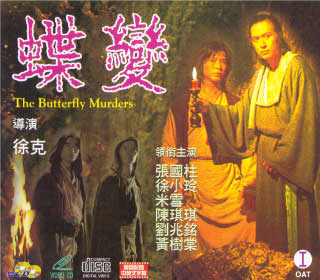

Top 10 list from James Chang


Top 10 list from James Chang
Dragon Inn (1967)(King Hu)
Although the remake of this film in 1992 by Tsui Hark is more provocative, with more clever wirework and dazzling fight choreography, I still consider the original version to be the greater masterpiece. This film really captures the spirit of ancient chivalry and the cinematic style is more exhilarating. The authenticity of the set is impeccable and the editing is also flawless. Also, it was not burdened by the 'method acting ' of Maggie Cheung, which showed too much Western influence, or the other swashbuckling characters.
The Killer (1989)(John Woo)
This is the masterpiece of the best disciple of King Hu, Chang Cheh and Melville. The violence, bloodshed, personal heroism and sense of brotherhood of Chang Cheh combined with the cinematic style of Melville (editing, shooting, etc.) and the result is a successful restoration of King Hu's chivalrous swordsmen as modern killers and cops - armed with guns and bullets instead of swords. Although Woo's work is often filled with cliches(look at CYF's image, it reminds me of Alain Delon in Le Samourai , and Danny Lee's , which resembles that of Clint Eastwood), they are always perfect in the technical aspect.
Raining in the Mountain (1979)(King Hu)
Though King Hu was greatly influenced by Japanese director Akira Kurosawa, he successfully made himself different by adding the essence of Zen Buddhism into his films. Although A Touch of Zen (1970) was brim with talent, Raining in the Mountain is definitely more complete in structure.
The Butterfly Murder (1979)(Tsui Hark)
Inspired by Alfred Hitchcock's 'The Birds' and Japanese Ninja films, this costume thriller was Tsui Hark's film debut. It also marked the beginning of a new era, the HK New Wave Movement. Ironically, Tsui Hark tried to explain in this film how the swordsmen actually 'fly' (concerning flying, his later works are in some sense ridiculous) by using their own instruments. The story is impeccable.
Homecoming(1984)(Yim Ho)
Perfect directing and perfect acting. Every emotion is smoothly expressed, being as calm and tranquil as water. What a perfect interpretation of Confucian's philosophy of life.
Once Upon a Time in China (1991)(Tsui Hark)
Another aspect of Confucian's philosophy of life----when you're at the critical point of life and death, choose to do what is right and fear nothing. Tsui Hark has rarely been so successful in telling us his ideals and showing such authenticity when dealing with costume design and art direction. The choreography was, of course, impeccably executed by Jet Li and Yen Si Kuan. Many Westerners consider OUTIC 2 to be better, indeed, when we are talking about story line, that might be the case, but do not forget, the real Wong Fei Hung was an advocate of constitutional monarchy and was expelled by Dr. Sun in the early 20s.
Summer Snow (1995)(Ann Hui)
Although not as provocative as Boat People (1982), this film showed the ultimate love for life and respect for others. Hui has proved herself to be the most humane among HK directors. Besides, Hui has always showed her great love for Chinese civilisation and has always regarded herself Chinese and not ' Overseas British ' like many HK people). She was born in the mainland and this has an enormous impact on her works, which always shows her concern for the people.
Security Unlimited (1981)(Michael Hui)
Unlike Ann, Michael has always represented the local Cantonese group and their ways of living. They never really care for others in everyday life and they might be greedy - however - from time to time they show their good nature. They never cry aloud for human rights or other serious stuff, instead, they have learnt how to make a better life under severe repression and humiliation.
Cageman (1992)(Jacob Cheung)
After watching the Cageman, I know how well off I am and how hypocritical is our society. Those men, those labourers who had spent all their lives serving us are at last regarded as useless and abandoned mercilessly. The film has no central figure, but has an exceptional ensemble cast led by Roy Chiao. (Note: There is another explanation for this film. The cage = undemocratic system. The building = Hong Kong. The tenants = different people in HK, e.g. bourgeois, workers, shopkeepers, aimless youths etc. The hypocritical senators = Chinese and British governments, etc)
Lover's Tear (1992)(Jacob Cheung)
After watching this depressing drama, my heart
was almost torn apart. In some sense, it resembles the works of Akira Kurosawa
in showing the ultimate misery people can suffer from. What can an illiterate,
half mute and deaf woman do when she was facing her fate? This is by far
not the worst thing. What really caused her misery was her ravishing beauty.
At last, I have learnt the meaning of ' being made a fool of by fate'.
Nina Li, who played the deaf lady, was simply astonishing, and so were
the rest of the cast - top billed by Sammo Hung.